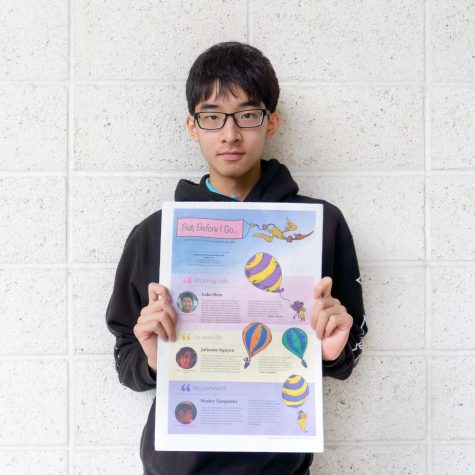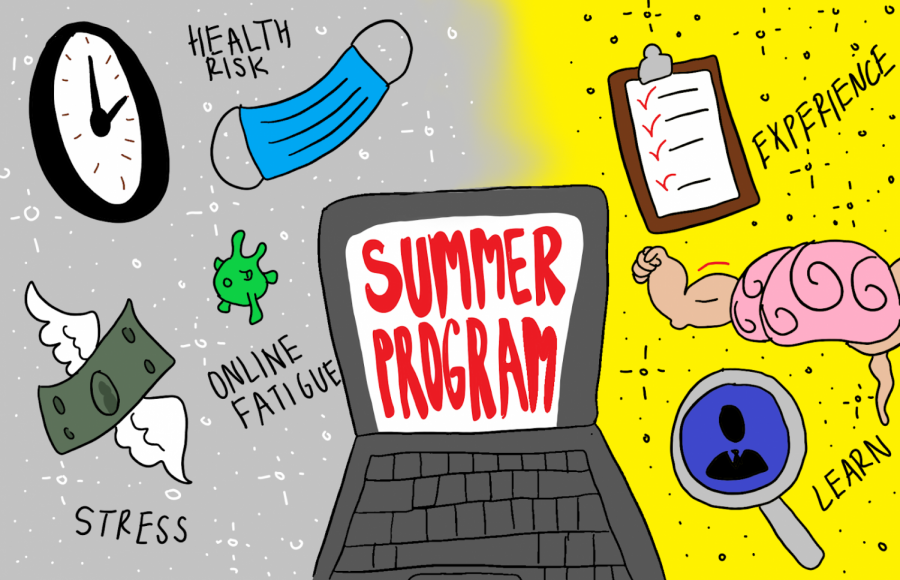Let Interests, Not Logistics, Guide Summer Program Selections
Though students’ focus on the distinction between online and in-person summer programs this year is founded on a variety of concerns, they should not lose sight of the undoubtedly positive experiences that all types of summer programs, whether virtual or physical, bring to the table, including insights offered by mentors and college-level expansion upon typical high school curricula.
With many prestigious summer programs just beginning to open applications for 2021, students face the arduous task of evaluating which learning experience to expect upon summer’s arrival. Though well-known summer programs such as COSMOS are leaning towards an online learning environment, there are still many programs that remain undecided on whether to pursue an online system. As such, students should consult their own interests and the content of each summer program, not learning format, in deciding whether to apply.
The distinction between an online learning experience and an in-person course is an important one. Online courses have the potential to inadvertently do away with student interactivity and can induce a lack of motivation as a result. Perhaps most critically, the element of building close relationships with summer program participants or mentors is greatly limited in online formats, according to biology teacher Michael Tang.
“You really get a sense of who someone is when you’re face-to-face, but then when you’re on Zoom, it’s a full-on time period where you have to work on Zoom, while you don’t really spend time with them outside it,” Tang said. “You could still establish networking and potentially form connections with other people, any of that could still be there, but I think it’s just the depth of relationships that are formed.”
Yet in the time of a pandemic, refusing to apply to online summer programs solely due to their disadvantages is ultimately short-sighted. According to junior Howard Zhang, despite his preference for an in-person summer program experience, the potential for summer programs to quickly change course demands patience and flexibility from students.
“For the online program I attended last summer, it just felt that there was not much opportunity to talk to other people in the program, and the courses were more like lectures rather than being able to participate,” Zhang said. “Even considering the disadvantages, I would attend the program if it was a subject that I really liked.”
In addition, it could be argued that some summer programs are currently better equipped to function virtually than in-person in the long run, not just as a situational means of preventing the transmission of COVID-19.
According to junior Desmond Wong, who attended a summer course at Irvine Valley College (IVC) in the summer of 2020 and is looking to apply again, the existing infrastructure for the college’s online courses provides for student accessibility and an effective learning experience.
“At IVC, it’s pretty straightforward and systematic. Last year, even though quarantining started in March, I attended it over the summer,” Wong said. “It worked so well last year, I don’t see any problems with IVC delivering the same quality of online classes this year.”
Despite the setbacks that may come with summer programs going online for 2021, students should look beyond the handful of disadvantages that online summer programs may present and instead consider the coursework and experiences they offer in a time when opportunities are hard to come by.
“It’s there; it’s available; it counts for something,” Tang said. “Just do it.”
Your donation will support the student journalists of Portola High School. Your contribution will allow us to purchase equipment and cover our annual website hosting costs.

Justin Tang is the Portola Pilot’s Back Page Editor for the 2021-22 school year, his second and last on the team. Throughout the year, he’ll make sure...

Krisha Konchadi is the front page editor this year on the Portola Pilot. Along with editing and creating the front page, she loves making graphics and...




